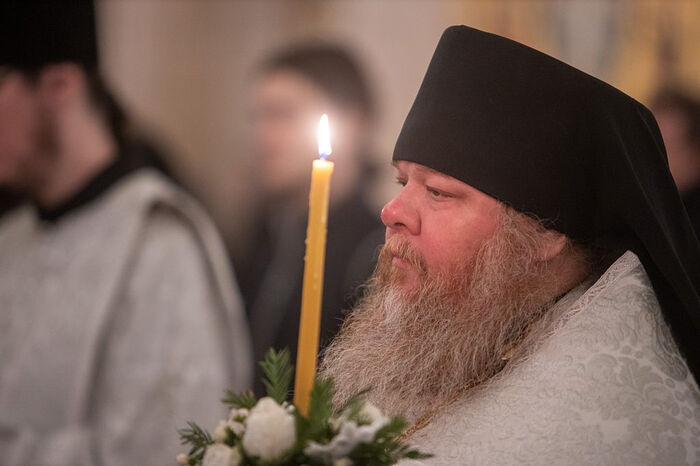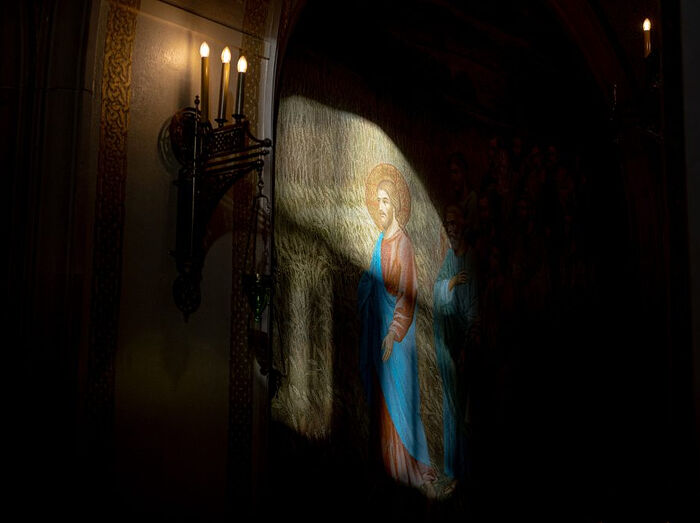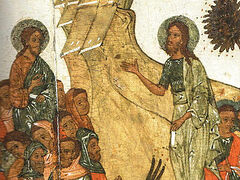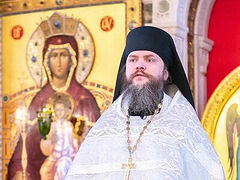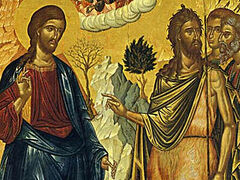In the name of the Father, and of the Son, and of the Holy Spirit!
Today we are celebrating the Baptism of the Lord with joy. Let’s grasp what this joy is like and what the meaning of the event being celebrated is. Although the Baptism of the Lord was apparently the same as that of all those who came to John the Baptist—immersion in the waters of the Jordan River—but the spiritual content was different. To be more exact, there were several goals.
Why did the sinless Savior, in Whom two natures—Divine and human—were united, need to be baptized by a man, the holy Prophet and Forerunner John the Baptist? The “new Adam”, as Christ is called by the Holy Fathers, assumed the whole human nature. This nature was fallen and spoiled by sin. And not only human nature, but the whole world: water, land, forests, fields, rivers, mountains, deserts, animals, birds and fishes—all living and non-living things together with man changed because man, the crown of God’s Creation, fell through his pride, disobedience and lack of abstinence, thus perverting his nature and the nature of the whole earth.
In order to rectify this situation and transform the nature of man and the entire universe, it was necessary to sanctify it by Divine power of the grace of Christ. And so, the God-Man descended into the waters of the Jordan and performed two deeds in one immersion.
Firstly, Christ took upon Himself the fullness of human sins. It is a geographical fact that the valley in which the Jordan River flows is the lowest point of land on earth—about 1380 feet below the level of the World Ocean. Thus, covering himself in the waters of the Jordan, the Lord symbolically descended to the very depths of earthly nature, of which man is also a part. He took upon Himself all the defects, all the sin of the world.
The second deed of Christ was the opposite action. With His Divine nature He sanctified the nature of water, the entire earth, the entire universe, and most importantly, human nature.
Another thing Christ did on that day was the example He set to all people. If Baptism was performed on the Son of God, then even more so it is a prerequisite for a sinful human being in order to attain salvation and inherit eternal life.
In this way, the fulfillment of all righteousness about which the Savior said takes place: For thus it becometh us to fulfil all righteousness (Mt. 3:15). Visibly Christ was immersed in the waters of the Jordan, and invisibly, the Holy Spirit penetrated through Christ into all the material nature of our earth, into that of man and animals, and the transfiguration of nature took place. Now this nature was freed from the power of the devil, sin and death and could begin a new stage of its existence.
Human nature was made capable of becoming immortal again. We can now move from death to eternal life without tasting hell. The Savior set us an example, the path that every Christian should follow. He would say that whoever believes and gets baptized will be saved.
From this moment on, everyone gets the right to enter the Church through Baptism in the name of the Father, and the Son, and the Holy Spirit, and live a fully-fledged spiritual and Church life. This life only begins with Baptism, and it is necessary to walk the whole path of Christ. As we know, the Savior fasted in the desert for forty days after His Baptism and was tempted by satan. He lived with the beasts, and the angels served Him. After that, He preached the saving Gospel for three years, chose disciples, suffered for the salvation of the world on the Cross, and by His Most Pure Blood and His death on the Cross He cleansed all sins that He had taken upon Himself during His incarnation and in the waters of the Jordan. He freed us completely from the power of death, sin and the devil, and gave us eternal life.
Now everyone has the boldness, has the right to enter the Church of Christ through Baptism, be united with the Body of Christ and inherit eternal life, having passed through his Golgotha and resurrection. For this one must live a fully-fledged spiritual and Church life, participate in the sacraments, receive and use the grace that Christ gives us through the Communion of His Body and Blood, through prayer, the Holy Scriptures, and through good deeds.
On this joyful and radiant feast of the Baptism of the Lord, let us remind ourselves of the vows that we took in Holy Baptism. This is a promise to God to live with a clear conscience before Heaven, before people and before ourselves, to fulfill God’s commandments, to bring goodness and light into this world.
May this radiant feast of the Theophany—the appearance of the Father in the voice from Heaven, the appearance of the Son of God Jesus Christ in the Jordan and the appearance of the Holy Spirit in the form of a dove—serve us as a good reminder of our Baptism and a joyful hope for eternal life in the Holy Spirit with the Father and the Son. Amen.

